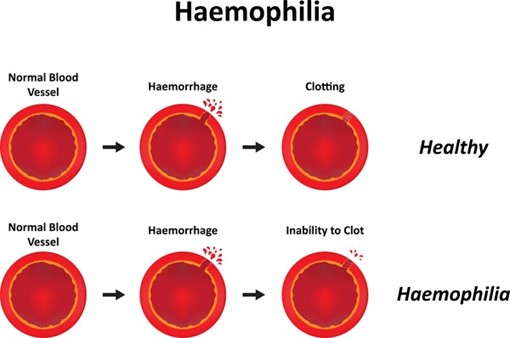A nurse is reinforcing teaching with a school-age child who has hemophilia about participating in school
sports. Which of the following sports should the nurse recommend for the child? (Select all that apply.)
Basketball
Gymnastics
Soccer
Swimming
Correct Answer : D
Swimming is the recommended sport for a school-age child with hemophilia. Hemophilia is a bleeding disorder in which the blood lacks certain clotting factors. Engaging in contact sports or activities with a high risk of injury can increase the chances of bleeding episodes and injury for individuals with hemophilia.
Explanation:
Swimming is a low-impact sport that minimizes the risk of injury and joint stress, making it an ideal choice for children with hemophilia. It provides a cardiovascular workout without subjecting the child to excessive physical stress or the risk of trauma that could lead to bleeding. Swimming also promotes muscle strength and coordination without putting significant pressure on the joints.
Now, let's discuss why the other options are not recommended:
Basketball involves physical contact and has a higher risk of falls, collisions, and potential injuries. These factors increase the likelihood of bleeding episodes for individuals with hemophilia.
Gymnastics also carries a high risk of falls, joint stress, and potential injuries. The impact and demanding movements involved in gymnastics can pose a significant risk for children with hemophilia, leading to bleeding complications.
Soccer is a contact sport that involves running, kicking, and potential collisions with other players. The physical demands and unpredictable nature of the game increase the risk of injury and subsequent bleeding for individuals with hemophilia.
In summary, swimming is the most suitable sport fo r a school-age child with hemophilia due to its low- impact nature and minimal risk of injury. It promotes physical fitness while minimizing the likelihood of bleeding episodes and joint stress.
r a school-age child with hemophilia due to its low- impact nature and minimal risk of injury. It promotes physical fitness while minimizing the likelihood of bleeding episodes and joint stress.
Nursing Test Bank
Naxlex Comprehensive Predictor Exams
Related Questions
Correct Answer is C
Explanation
Choice A reason: A negative-pressure isolation room is not appropriate for this client because it is used for clients who have airborne infections that can spread through small droplets that remain suspended in the air, such as tuberculosis, measles, or chickenpox. Scabies is a skin infection that is spread by direct contact with infested skin or clothinG.
Choice B reason: A positive-pressure isolation room is not appropriate for this client because it is used for clients who have compromised immune systems and need protection from environmental contaminants, such as bone marrow transplant recipients, burn victims, or organ transplant recipients. Scabies is not caused by environmental contaminants, but by parasitic mites that burrow under the skin.
Choice C reason: A private room is appropriate for this client because it prevents contact transmission of scabies to other clients or stafF. The client should also have dedicated equipment and linens, and wear gloves and gown when leaving the room. The room should be thoroughly cleaned and disinfected after the client's dischargE.
Choice D reason: A semi-private room with a client who has pediculosis capitis is not appropriate for this client because it increases the risk of cross-contamination between the two clients. Pediculosis capitis is a head lice infestation that can also be spread by direct contact with infested hair or personal items.
Correct Answer is D
Explanation
Choice A reason: Proactive prevention is not a level of prevention, but a type of prevention that involves anticipating and avoiding potential health problems before they occur.
Choice B reason: Secondary prevention is a level of prevention that involves screening, early detection, and prompt treatment of health problems to prevent complications and limit disability.
Choice C reason: Tertiary prevention is a level of prevention that involves rehabilitation, restoration, and support of health and function after a health problem has caused damage or disability.
Choice D reason: Primary prevention is a level of prevention that involves health promotion and protection of health and well-being by reducing or eliminating risk factors and preventing the onset of disease or injury.
Whether you are a student looking to ace your exams or a practicing nurse seeking to enhance your expertise , our nursing education contents will empower you with the confidence and competence to make a difference in the lives of patients and become a respected leader in the healthcare field.
Visit Naxlex, invest in your future and unlock endless possibilities with our unparalleled nursing education contents today
Report Wrong Answer on the Current Question
Do you disagree with the answer? If yes, what is your expected answer? Explain.
Kindly be descriptive with the issue you are facing.
